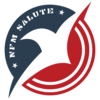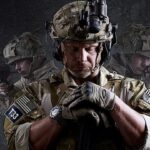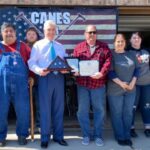NFM Lending is pleased to honor Captain Johnnie Ashe, USMC, Retired Captain, as the NFM Salute for October 2020.
Johnnie Ashe was born in 1948 and raised in Richmond, Virginia along with his older brother, Arthur. Like many younger siblings, Ashe admired his brother, who showed an early giftedness for academics and tennis. At a young age, Ashe knew Arthur was destined to change the world for the better. Though both brothers were involved with tennis, Arthur decided to pursue it seriously. Succeeding in tennis would be his ticket out of racially segregated Richmond and give him a platform to speak out against injustice.
By 1965, the nation was restless with racial strife and polarization over the Vietnam Conflict. Wanting to prove his own worth, Ashe enlisted in the Marine Corps at age 17 and was soon sent to Vietnam. He served with the 1st Service Regiment and the 3rd Marine Amphibious Force.
In 1967, Ashe was nearing the end of his tour, but was concerned about his brother’s safety. Arthur was also serving in the military as an Army lieutenant performing data processing at West Point. Arthur had 15 months left in his contract, but now that Johnnie was back, it became more likely Arthur could get sent to Vietnam. Ashe had heard of the so-called Sullivan Rule. While unofficial, the military discouraged brothers from serving in major conflicts at the same time. So, in 1968 during the height of the Vietnam Conflict, Johnnie requested to take another tour of duty and only told his father the real reason for his reenlistment – to avoid his brother having to go to Vietnam.
Arthur Ashe went on to become the first African American man to win at the US Open in 1968, the Australian Open in 1970, and Wimbledon in 1975. Johnnie recalled, “He called me at the barracks. What he said to me was…in a sense provocative for him, but it also told me that he had realized his responsibility. He said, ‘I’m a champion now. When I speak, people will listen.’” Arthur left not only a legacy in the tennis world but also made a global impact with his civil rights and AIDS awareness activism. Of his brother, Ashe said, “There had to be someone who could show the rest of the world that we as a people are capable of doing things other than just entertaining and playing sports, because in those days that was the big thing that most people felt that we were good for.”
Ashe made a career of the Marines, serving for 20 years and retiring as a Captain. Ashe looks back on his time with the military with gratitude, saying, “I got to meet some fantastic individuals. I was able to rise in the ranks pretty easily. I was exposed to people from all over the world, different thoughts. The time that I spent in Okinawa and in the Philippines was definitely rewarding.” He now resides in Port St Lucie, Florida with his family.
NFM Lending is proud to donate $2,500 to One Love Lenny Simpson Tennis and Education Fund on behalf of Ashe. NFM looks forward to the opportunity to continue to honor military and Veterans through the NFM Salute initiative.
Full Transcript of Video Interview is Below:
– Welcome to our NFM Salute for the month of October. I’m Greg Sher. His story has been chronicled throughout many publications, many networks all over the world. It’s the story of brotherly love of time served in the military and so much more. Joining us now is Johnnie Ashe who served in Vietnam from 1966 to 1968. Joins us from Port St. Lucie, Florida. Johnnie, thanks for being with us on NFM. Thank you for your service.
– You’re very welcome.
– The name Ashe. It’s a well known name, your older brother, Arthur Ashe was a grand slam champion. He won 33 titles in his lifetime. We’re gonna get into that and your relationship with him. But first we wanna talk about your service. What can you tell us about those years?
– Vietnam was a situation we really didn’t have to be in, but it was, you might say our generation’s skirmish. Left a lot of scars, created a lot of problems at home. What amplified that is, during those years with what was going on in the States with the civil rights movement and especially in ’68 with the number of people who left us the wrong way, it caused a lot of us who were there to take seriously about our lives rather than just being, you know, away from home, getting shot at. It made a lot of us come of age.
– So your first tour in Vietnam started in 1966, July of 1966. And in July of 1967, you would go home and you would notify your father that you wanted to go back for another tour of duty. Why did you do that and what was his reaction?
– He immediately said, “Johnnie, what are you doing home? It’s a month early.” And I said, “Daddy, I’m going back to Vietnam.” He said, “What for?” And I said, “Because I don’t want Arthur to have to go. He will have 15 months left if I came back when I was supposed to.” And he said to me, well, after dropping his head and giving it some thought he said, “Well, that I can understand.” And that was actually the end of the conversation.
– And Arthur was stationed at West Point at that time. And there was a rule that prevented brothers from serving simultaneously. So you did the most selfless thing you could do. And that was go back and put yourself in the line of fire so that your brother could continue his tennis career. It was also around that time Martin Luther King was assassinated. So there was a lot of havoc going on in the United States, all the while Arthur Ashe, who was an amateur, managed to win the 1968 US Open. And it was that moment where he would say later he gained his voice. What did he mean by that? And what did he do with that?
– Two or three hours later, he called me at the barracks. And you know, the first thing out of my mouth was, “Hey Bro, congratulations.” And what he said to me was something that was in a sense provocative for him, but it also told me that he had realized his responsibility. He said, “I’m a champion now. When I speak, people will listen.”
– And his voice was heard and is still heard to this day. Arthur sadly passed due to AIDS after a heart bypass surgery and a bad blood transfusion. He died at the age of 49, but in a lot of ways, his voice, it still reverberates. It still impacts society. And I can imagine that there’s a ground swell of pride, knowing that his legacy will live on forever.
– There had to be someone who could show the rest of the world that we as a people are capable and we as a people are capable of doing things other than just entertaining and playing sports because in those days, that was the big thing that most people felt that we were good for.
– Your brother would say that he wanted to be the next Jackie Robinson of tennis. He wanted to break the color barrier. And he went in Jackie’s footsteps. He went right to UCLA. He became a champion at UCLA and he really lived by that dream and that wish. What did that mean to him?
– Arthur respected Jackie Robinson as his guiding principle in a lot of ways. Jackie wasn’t a very boastful guy and he let the way he lived and his contributions do the talking for him. And I think that’s one of the reasons why Arthur chose to give back the way he did.
– [Greg] In 1975, he pulled one of the biggest upsets in the history of any sport, any championship when he took down Jimmy Connors. Can you talk about that match and how you would describe how he went about beating the great Jimmy Connors?
– [Johnnie] It is said that Arthur played American Tennis Association, which was the black association tennis. He softballed him. He didn’t give him any pace. And Jimmy was known to have a problem hitting short balls with his forehand because he had that particular grip that he used. The problem was the strategy was completely adverse in the way Arthur played. So, you know, he had to, overnight, just change his entire pattern of play to beat Jimmy. And that’s what surprised everybody, because if Arthur had played his normal way Jimmy would have beat him without a doubt.
– We talked about civil rights and the period of time in which Arthur started to blossom. And I think it’s a natural question, given the events going on in the world today to ask you what you think Arthur would have to say about the current environment that we’re in and about the progress that’s been made.
– I think he would say it hasn’t been enough progress made. Black Lives Matter. You know, all lives matter. We shouldn’t be still having to go through hurdles to prove ourselves. I know for a fact that he would be involved any way he could backing the individuals that he felt that were worthy and would take us in the right direction.
– Johnnie, when you think about Arthur, what do you miss the most about him?
– I miss the brotherly love. I miss just being able to say, “Hey bro, how you doing?” You know, I miss those things that any brother who came from a loving family misses. But the one thing that I think I miss the most is being able to understand and hear his intellect. He had a way of just viewing things differently from most, and it has a tendency to open your eyes to things you didn’t think about. And I miss that greatly.
– Before we wrap this up, I wanna go back to your military career. 20 years in the Marine Corps, you became an officer. You rose to Captain. When you think back to your 20 years of service, what are some takeaways for you?
– Marine Corps was actually easy for me because I tell people Arthur Ashe Senior was the best drill instructor I ever knew. Daddy was a no-nonsense individual. It was right or wrong. There’s no gray area. The regimentation that the Marine Corps required came as second nature to me.
– Do you look upon those 20 years fondly?
– Oh, without a doubt. You know, I got to meet some fantastic individuals. I was able to rise in the ranks pretty easily. I was exposed to people from all over the world, different thoughts. The time that I spent in the orient in Okinawa and in the Philippines was definitely rewarding.
– Johnnie Ashe, this has been a real pleasure. We really appreciate the time you spent with us here. And congratulations again on being our October NFM Salute. Thank you so much for your service from all of us here, and we’ll be sure to keep in touch.
– Thank you. That’s Johnnie Ashe, our October NFM Salute. I’m Greg Sher. We’ll see you again next time.


